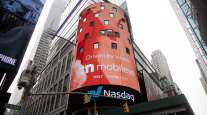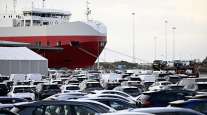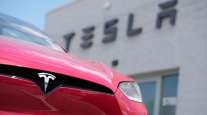Bloomberg News
Tesla Wins First Jury Trial Over Fatal Autopilot Crash
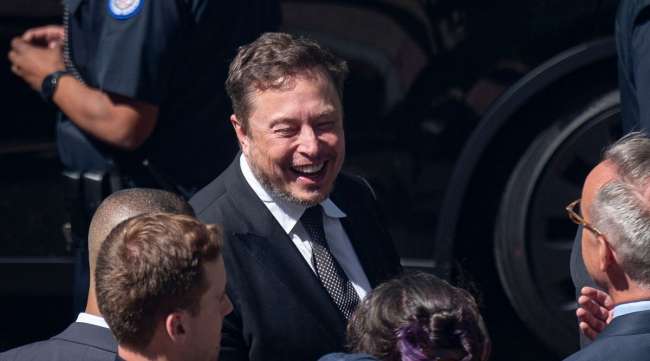
[Stay on top of transportation news: Get TTNews in your inbox.]
Tesla Inc. convinced a jury that its Autopilot technology wasn’t responsible for a crash that killed a California driver four years ago, vindicating the driver-assistance system that’s a core part of Elon Musk’s efforts to make his electric-car company stand out from rivals.
Jurors in state court in Riverside, Calif., on Oct. 31 sided with Tesla in the first lawsuit blaming a fatality on Autopilot to go to trial. The two surviving passengers who were seriously injured sought $400 million in damages for physical injury, mental anguish and loss of the driver’s life.
Tesla’s eight-year experiment with semi-autonomous driving is mired in controversy even as Musk has maintained that the technology makes his cars the safest ever produced.
The company faces federal probes into whether defects in Autopilot have contributed to at least 17 deaths since June 2021 as well as regulatory investigations and lawsuits over claims that it has overhyped its progress toward hands-free driving. Several suits over fatal crashes are headed to trial in the coming months in California and Florida.
Tesla’s stock gained about 1% on the verdict and was trading at $201.97 at 3:10 pm in New York. But the shares are set to wipe out nearly one-fifth of their value in less than two weeks amid growing concerns that demand for electric cars is starting to weaken.
The trial that played out in Riverside for almost a month focused on Micah Lee, whose Model 3 veered off a freeway in Southern California in 2019, slammed into a tree and burst into flames.
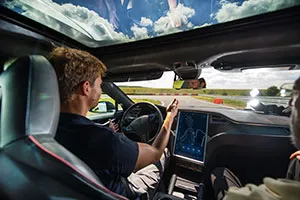
A test driver removes his hands from the steering wheel of a Tesla Model S in 2017. (Andreas Arnold/Bloomberg News)
Lawyers representing the crash survivors argued that a manufacturing defect in Autopilot mode caused the car to sharply swerve off the road. The company contended Lee had been drinking alcohol before he got behind the wheel and that there was no evidence he had even activated Autopilot before the collision.
The 12-member jury reached its verdict in its fourth day of deliberations.
Company representatives and lawyers for Tesla and the plaintiffs didn’t immediately respond to requests for comment.
On the first day of trial in September, Tesla’s lawyers claimed “classic human error” caused the accident. They showed jurors a video clip of testimony by passenger Lindsay Molander, who recalled that Lee consumed a drink and she had some wine while they were having dinner in the Downtown Disney District in Anaheim, Calif., earlier on the evening of the crash.
Jonathan Michaels, an attorney representing Molander and her son Parker Austin, who was 8 years old at the time of the crash, put full blame on Tesla’s technology.
The driver-assistance system malfunctioned and sent out an “excessive steering wheel angle command,” Michaels told jurors Oct. 24 during closing arguments, citing internal company records about a 2017 Autopilot-related safety analysis which he said identified a defect that causes Tesla vehicles to unexpectedly move into adjacent lanes or off the road.
“We know it’s not possible for a driver to have done this,” Michaels said, referring to how the car suddenly swerved. “We know Autopilot went crazy. We know this is a manufacturing defect.”
Tesla’s attorney, Michael Carey, told jurors any claims of an Autopilot defect were just “hot air” that aren’t backed by any evidence. “We know that the only way that this car steers to 43 degrees in this time is Mr. Lee or somebody else in that car played a role in turning that steering wheel,” Carey said.
Want more news? Listen to today's daily briefing above or go here for more info
Tesla sympathizes with Molander and her son, “but it’s not Tesla’s fault, it’s not Tesla’s responsibility,” Carey told jurors.
Earlier this year, Tesla prevailed in its first trial over a nonfatal Autopilot crash when a Los Angeles jury rejected a woman’s claim that the driver-assistance system caused her Model S to veer into the center median of a city street.
The company’s website says Autopilot and its “Full-Self Driving” feature are “intended for use with a fully attentive driver, who has their hands on the wheel and is prepared to take over at any moment.”
The case is Molander v. Tesla Inc., RIC2002469, California Superior Court, Riverside County.


